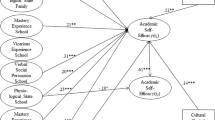Abstract
Two studies assessed the determinants of children's academic self-efficacy beliefs. First, the effects of performance accomplishments, modeling, locus of control, and their interaction were investigated on 504 children's [Mage = 11 years 7 months)self-efficacy beliefs. Contrary to theoretical predictions, performance accomplishments did not account for any of the variance in self-efficacy beliefs, although modeling was highly significant. The significant modeling ×attributional style interaction showed that externally oriented children were more amenable to modeling effects. The second study assessed whether contextual factors together with performance accomplishments and modeling account for more of the variance in self-efficacy beliefs. Modeling was again the most significant predictor of self-efficacy beliefs. However, when performance accomplishments reflected the self-rating of continuous participation in the classroom, self-efficacy was predicted significantly. In addition, a contextual factor, Rule Specification, also predicted self-efficacy beliefs significantly. In general, theoretical predictions were supported, although the hypothesized order of the importance of performance accomplishments and modeling was reversed, and this was attributed to the age of the present sample.
Similar content being viewed by others
References
Arlin, M. M., & Hills, D. Comparison of cartoon and verbal methods of school attitude assessment through multitrait-multimethod validation.Educational and Psychological Measurement 1974,34 989–995.
Bandura, A.Principles of behavior modification. New York; Holt, Rinehart & Winston, 1969.
Bandura, A. Self-efficacy: Towards a unifying theory of behavior change.Psychological Review 1977,84 191–215. (a)
Bandura, A.Social learning theory. Englewood Cliffs, New Jersey: Prentice-Hall, 1977. (b)
Bandura, A. Reflections on self-efficacy.Advances in Behaviour Research and Therapy 1978,1 237–239. (a)
Bandura, A. The self-system in reciprocal determinism.American Psychologist 1978,33 344–358. (b)
Bandura, A., & Adams, N. E. Analysis of self-efficacy theory of behavioral change.Cognitive Therapy and Research 1977,1 287–310.
Bandura, A., Adams, N. E., & Beyer, J. Cognitive processes mediating behavioral change.Journal of Personality and Social Psychology 1977,35 125–139.
Bandura, A., Jeffery, R. W., & Gadjos, E. Generalizing change through participant modeling with self-directed mastery.Behaviour Research and Therapy 1975,13 141–152.
Brady, P. J., Figuerres, C. J., Felker, D. W., & Garrison, W. M. Predicting student self-concept, anxiety and responsibility from self-evaluation and self-praise.Psychology in the Schools 1978,15 434–438.
Cohen, J. Multiple regression as a general data analytic system.Psychological Bulletin 1968,70 426–433.
Crandall, V. C., Katkovsky, W., & Crandall, V. J. Children's belief in their own control of reinforcement in intellectual-academic environment situations.Child Development 1965,36 91–109.
Franks, C. M., & Wilson, G. T. (Eds.).Annual review of behavior therapy: Theory and practice (Vol. 6). New York: Brunner/Mazel, 1978.
Grusec, J. E., & Mischel, W. Model's characteristics as determinants of social learning.Journal of Personality and Social Psychology 1966,4 211–214.
Jastak, J. F., & Jastak, S. R.Wide range achievement test. Wilmington: Guidance Associates of Delware, 1965.
Kazdin, A. E. Conceptual and assessment issues raised by self-efficacy theory.Advances in Behaviour Research and Therapy 1978,1 177–186.
Kirkland, K. D., & Thelen, M. H. Uses of modeling in child treatment. In B. H. Lahey & A. E. Kazdin (Eds.),Advances in clinical child psychology (Vol. 1). New York: Plenum Press, 1978.
Moos, R. H. A typology of junior high and high school classrooms.American Educational Research Journal 1978,15 53–66.
Moos, R. H., & Trickett, E. J.Classroom environment scale manual. Palo Alto, California: Consulting Psychologists Press, 1974.
O'Leary, K. D., & O'Leary, S. G. (Eds.).Classroom management: The successful use of behavior modification (2nd ed.). New York: Pergamon press, 1977.
Overall, J. E., & Spiegel, D. K. Concerning the least squares analysis of experimental data.Psychological Bulletin 1969,72 311–322.
Rubin, R. A. Stability of self-esteem ratings and their relation to academic achievement: A longitudinal study.Psychology in the Schools 1978,15 430–433.
Windheuser, H. J. Anxious mothers as models for coping with anxiety.European Journal of Behavior Analysis and Modification 1977,2 39–58.
Author information
Authors and Affiliations
Rights and permissions
About this article
Cite this article
Keyser, V., Barling, J. Determinants of children's self-efficacy beliefs in an academic environment. Cogn Ther Res 5, 29–39 (1981). https://doi.org/10.1007/BF01172324
Issue Date:
DOI: https://doi.org/10.1007/BF01172324




